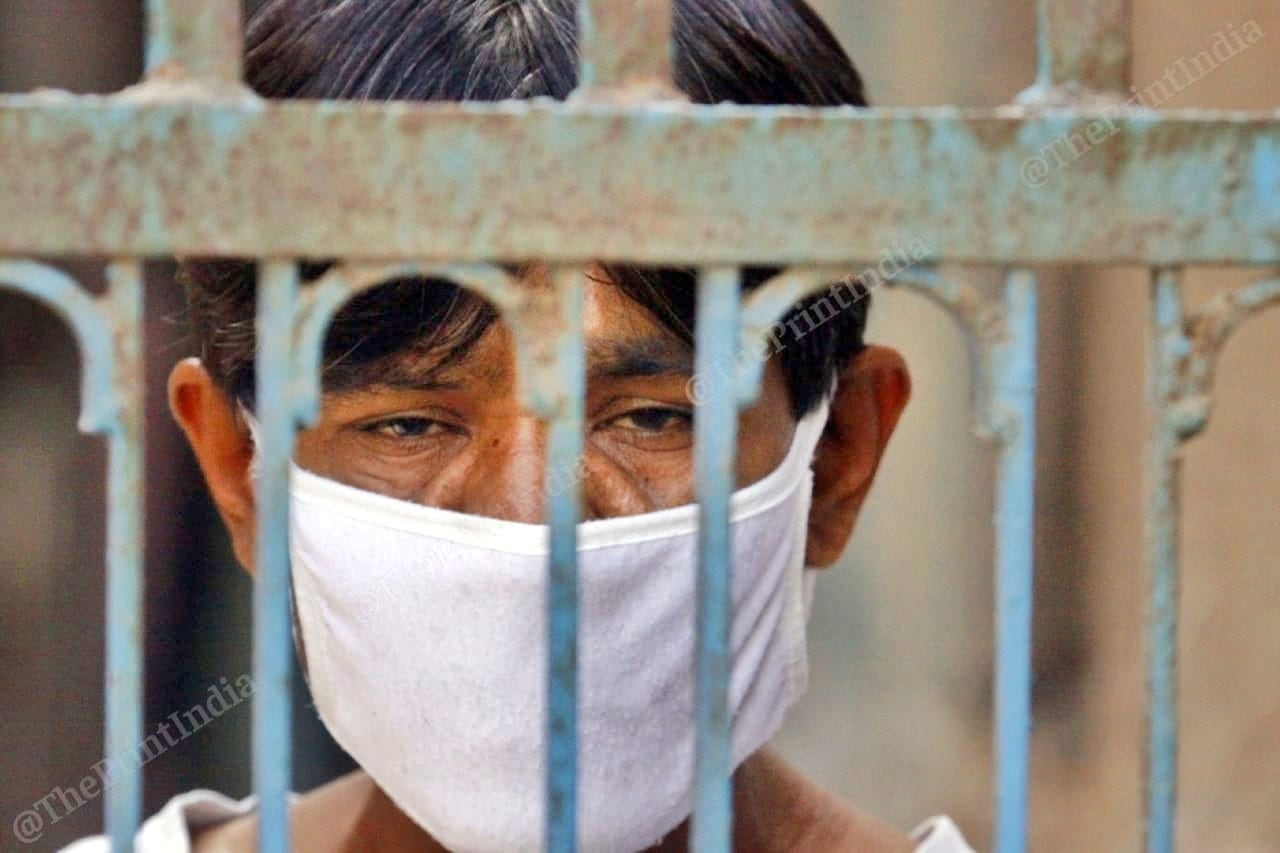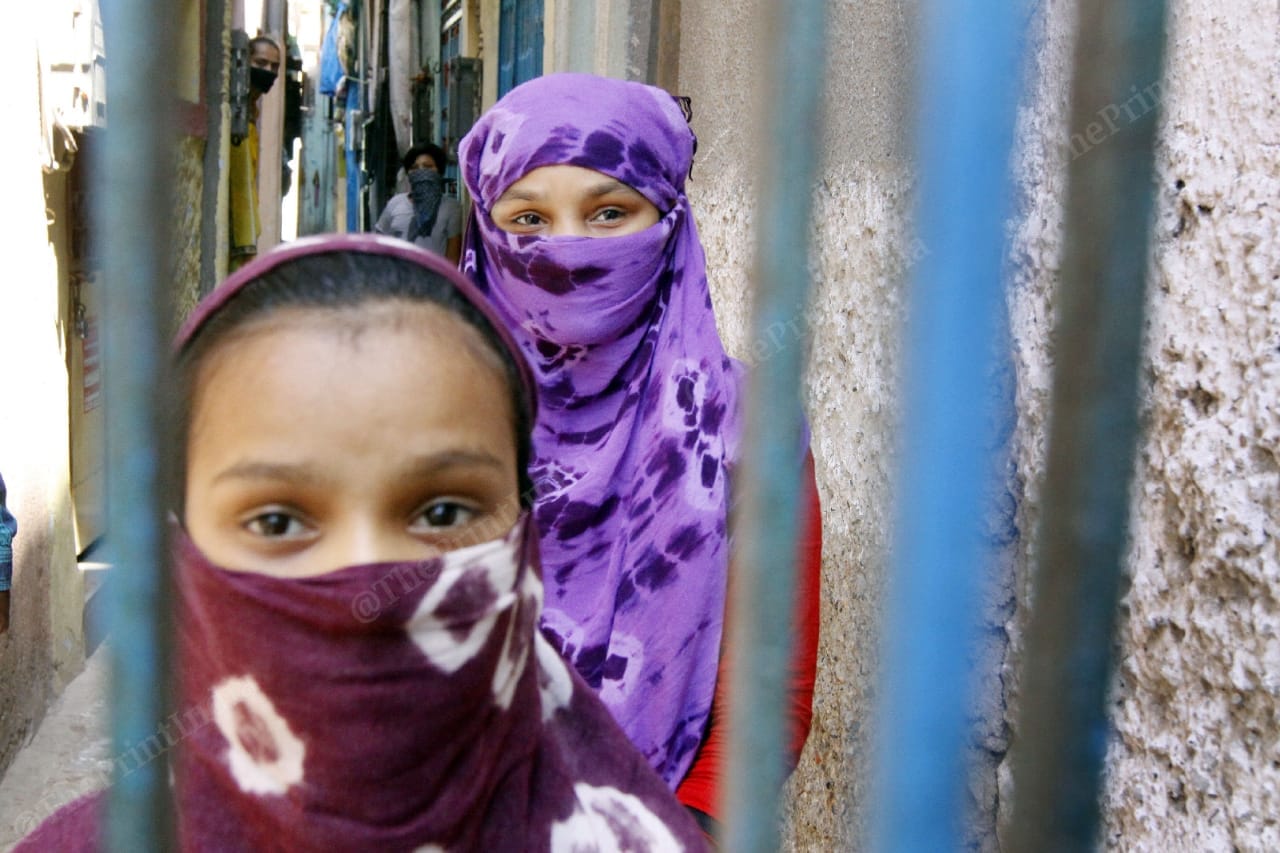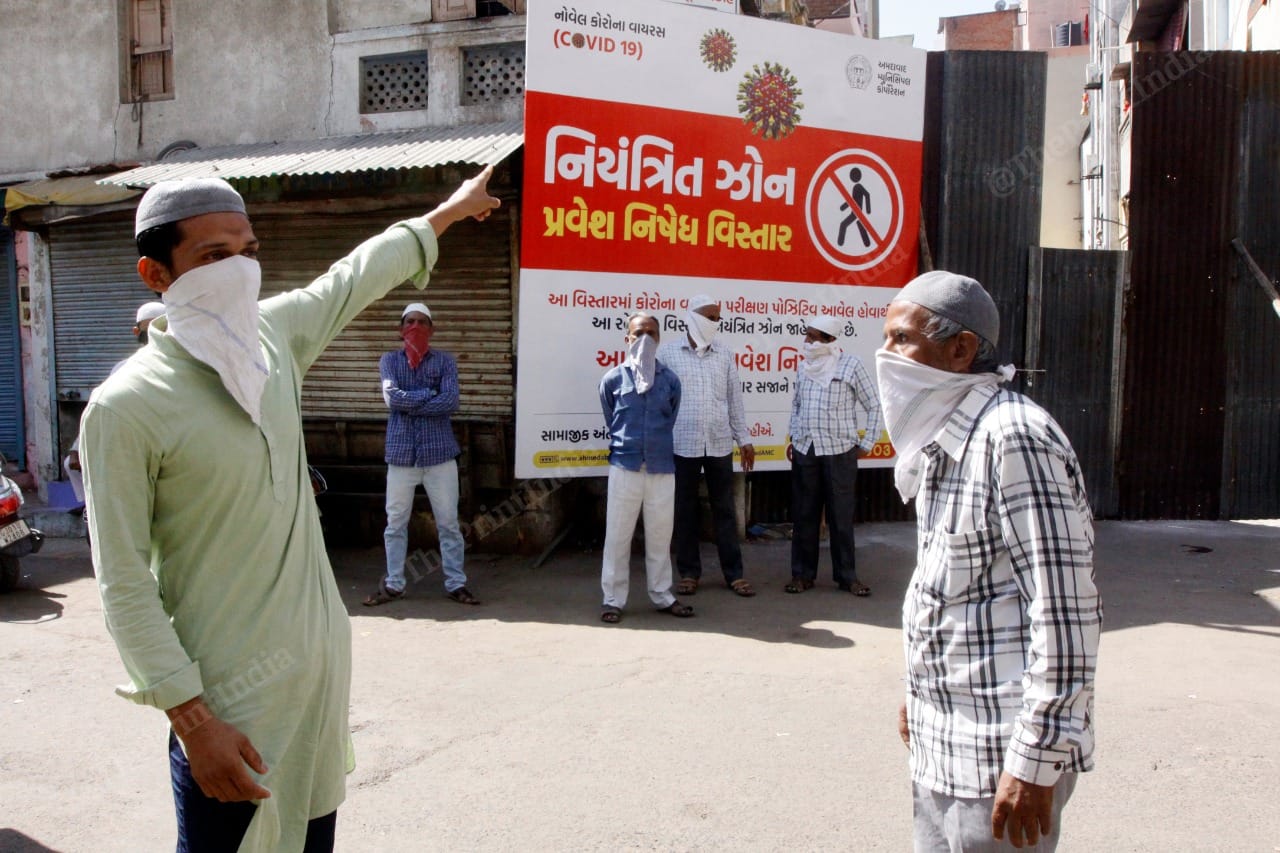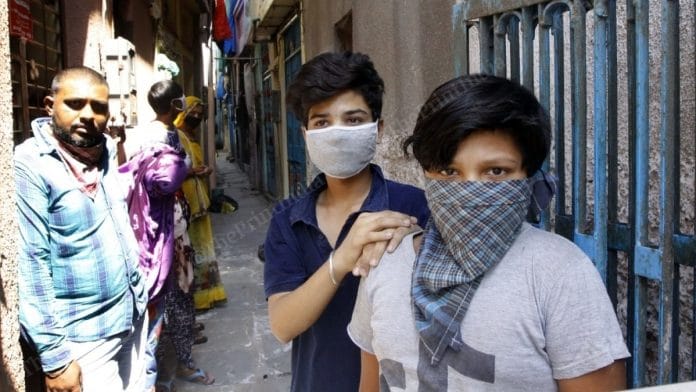Ahmedabad: On Ahmedabad’s widest roads, the lockdown’s enforcement is impressive: Police checkposts dot almost every corner, and barring a car or two, the streets are empty. But in the Ahmedabad’s more ghettoised areas, where houses are stacked one on top of the other, people spill out onto the barricaded streets at all times of day.
“It has been 10 to 12 days since we called the police, or anyone from the municipality to enforce social distancing here, or to resolve any of our other queries. But no one has come,” said Arvind Makhwani, who lives in Behrampura, among the city’s most volatile cluster containment zones.
“No one has come to see how many of us have food, how many don’t. Even the testing is patchy, they have left out some family members in the testing process,” he said.
At least 60 Covid-19 positive cases have emerged from the street Makhwani stood in, called the Doodh Wali Chali, while all of Behrampura has accounted for 173 cases as of 20 April. Behrampura lies on the east side of the Sabarmati, and is among the colonies that is responsible for a bulk of Ahmedabad’s cases.
In one of the bylanes, barricaded with a thick sheet of asbestos, lives Mukesh Parmar and his family, who say they were tested and found Covid-negative 10 days ago, and sent back home with ration to last a month.
“They have given enough ration to last one month. But we don’t get any milk for the children, and that’s causing problems. Whenever we call the helpline number, they refer us to other numbers,” Parmar said.
“What’s worse is that there’s a family who lives behind us who hasn’t yet been tested while everyone else in the building has. No one has come to check on them at all.”

This is the situation in many of the poorer ghettos of Ahmedabad, which has become one of India’s worst-affected cities, accounting for 1,298 confirmed infections out of Gujarat’s 2,624 Covid-19 cases.
To tackle the Covid-19 spread, the city’s municipal commissioner Vijay Nehra told ThePrint that Ahmedabad was following what it calls the ‘chasing the virus’ strategy — which involves keeping all contacts of a positive patient quarantined and testing those who show symptoms.
While Gujarat’s testing per million rate is at about 568, Nehra claimed the city is conducting among the highest testing per million in the country — at 2,600. Delhi and Maharashtra are at 1,318 and 679, respectively.
But residents in these ghettos suggest that the government has all but abandoned them.
Also read: Amid Covid crisis, Karnataka sees ‘abnormal rise’ in child marriage, abuse complaints
‘Haven’t been screened or tested’
Eighteen-year-old Rekha Maheshwari Parmar and her 8-year-old sister, Priyanka, told ThePrint they had neither been screened nor tested after 10 members of their family — including parents — were found to be Covid-positive on 19 April. They live in a house behind Mukesh Parmar’s in Behrampur.
“We haven’t had our temperature taken either. When the doctors came and took our family members away they told us they were positive, but didn’t test us,” Rekha told ThePrint. “They didn’t leave us a food packet. Our neighbours have been feeding us,” she said, pointing towards Mukesh Parmar.

Two more boys in the same bylane have the same tale to tell: Mihir Parmar (16) and his brother Umesh (12) said four members of their family were tested and taken to Civil Hospital for treatment, but they were left behind.
“They (the doctors) said they had run out of testing kits by the time our turn came, and said they would come the next day. But no one has come till now. We don’t know who to ask,” said Mihir. The boys, however, said they received a dry food packet.
Mukesh Parmar is worried that if the children (the two sisters and brothers named above) are positive, the whole bylane could be infected and no one would know, especially since most of those left behind — except the four — had already been tested and found to be negative.
On the other side of the street, 23-year-old Mukesh Arjanbhai’s mother developed a cough and decided to get herself tested. Without confirming the status of her case, she was taken into quarantine in Civil Hospital by doctors who did not test Mukesh. He also said he was being fed by neighbours and the community kitchen set up by residents for those without adequate food.
He continues to live in the colony, freely interacting with others within the barricaded street.
“No one is coming in to monitor what is happening or provide for the residents here. We need more help — not just with enforcing social distancing, but with daily needs of the people,” said a member of the Ahmedabad Municipal Corporation, who had been stationed on the street to monitor residents’ movements and didn’t wish to be named.
“We’ve called the police and the administration, but they are not coming here.”
Also read: Not enough PPE, no insurance — how India’s police is fighting Covid battle unarmed
‘Can’t go to the doctor’
In Jamalpur, the poorest hotspot ThePrint visited, residents sat outside their houses holding their heads. At least 200 cases of Covid-19 have emerged from this area — several cases come out of the neighbourhood daily.
While the area has been strictly cordoned off, residents said access to healthcare facilities — especially for those who have not been infected by Covid-19 — has been difficult.
“I’ve been vomiting for 10 days and I haven’t been able to eat anything. The hospital hasn’t given me an IV drip or taken any tests to see what’s wrong. Private clinics are closed and they don’t let us go out easily,” Zareena Banu told ThePrint.
Her husband Sarvar Khan interjected and said, “They say they won’t admit any non-Covid patients and that their doctors are unavailable due to the surge in coronavirus patients. Shouldn’t the hospital be open for those who are sick? What if she has typhoid? We would never know.”
The neighbourhood is located just adjacent to the historic Jamalpur Gate in the Walled City, which was once a symbol of protection for Ahmedabad. Its residents now lament that it has become a place of dread.
“It’s all the poor, Muslim colonies that have been cordoned off. The poor are bearing the brunt of this illness which has been inflicted on us. No one has come to check on us,” said Akbar Haji Mohammed Kholiyawala, an elderly resident of the area.
“So many people are dying here. Four to five people. Everyone is stressed and terrified.”
Gujarat has among the steepest Covid-19 death rates in the country.
Shahid Chippa, a relative of Kholiyawala’s alleged there was a spike in deaths in the colony — and not all were coronavirus-related.

“All the clinics are closed. People who are sick, not necessarily with the coronavirus, are scared and not getting access to doctors. More people are dying because of this,” he said.
In Danilimda, another Muslim-dominated hotspot about 3 km away where 73 positive cases have emerged, police can be seen patrolling the bylanes to make sure people stay inside.
Residents of this colony — which appears more middle class with its larger houses and balconies — said only those who are in quarantine are being supplied food and the administration makes regular trips to the area.
“Those across the barricade, in quarantine, have been getting supplies. They’ve stopped vegetable vendors from coming inside because they’ve been identified as super spreaders. We’re managing with some dal and rice reserves,” said Mohammed Husen, who has a family of four.
Also read: India’s testing strategy is right, we have increased the numbers significantly: AIIMS chief
‘Following a reverse strategy’
Amid such criticism, ThePrint spoke to Ahmedabad’s Medical Officer of Health, Dr Bhavin Solanki, who said the administration is trying to cover all the “super-spreaders”.
“If someone is not showing symptoms, there is no need for testing — they simply need to remain home quarantined. If they develop symptoms, they must call 104 helpline or visit our health centres,” said Solanki.
“We are doing door-to-door testing everyday, of between 700-1,000 people. We are collecting 15 samples per ward, and we are trying to cover all the super-spreaders — those delivering milk, newspapers etc. We are concentrating on them and positive contacts.”
City municipal commissioner Nehra added that over 700 medical teams were conducting screenings in hotspot areas every day, which is how cases were eked out of congested colonies like Behrampura.
“In congested areas like slums, we’re following a reverse strategy, whereby everyone in contact with a positive patient is taken to one of our quarantine facilities and then checked daily,” Nehra said.
“We have found 1,064 positive cases through active surveillance, and have placed 6,330 people in quarantine,” he said.
However, the director of a private hospital in Jamalpur who didn’t wish to be named said healthcare workers didn’t frequent hotspot areas.
“They come once and then don’t come again. Not enough tests are being done. If you are to find all those who are positive, then each contact needs to be tested. It seems there are not enough people on ground who are doing the tests,” he claimed.
Also read: India would have seen over 1 lakh cases without lockdown: Covid-19 panel head VK Paul
This report has been updated to correct a typo







As of yesterday, there are 2180 case in Ahmedabad. Please correct it.
no CM,,,, No PM,,,, and no HM to brag about their model town,,,, and where has the money gone if so many in their own backyard are crying for help,, , am sure all three have an excuse,,, do they want or need NGO, s to do the needful,,,, shame on three stalwarts claiming they as a govt are doing the best in the world,,,, lies,,, lies and more white lies
Pleading to maintain social distancing were unheard by these highly literate community but now want to be treated well when there is limited testing kits and medical warriors. The Print will always show Hindus and present government in bad light to serve their fake gandi surname masters.
You can’t just keep blaming the government. If the test kits got over or one member was taken from the family having tested positive. Isn’t it the social responsibility of the left out family member to practice social distancing and quarantine out of sheer self and public responsibility? Roaming in the bylanes! Is that your response to this pandemic? Shame on you!
Why do want the government to come and slam a stamp to your forehead and cuff you? Only then will you understand what you need to on your own? It’s a combined effort and it will succeed with public participation and not otherwise
Namaste Trump proved to be big blunder so far Covid 19 is concerned,RSS activists from all India visited and became carrier of corona virus
Awesome ! U guys deserve this !
The Kerala model is giving a better account of itself.